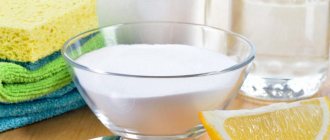A product such as fish is not only tasty, but also healthy. Nutritionists from all over the world advise consuming it at least once a week. However, despite the large number of beneficial properties, those who like to feast on this seafood note a huge drawback that discourages any desire to cook - a specific aroma. The smell of fish spreads everywhere and gets into everything: knives, cutting boards, dishes, frying pans, clothes, it is not washed off your hands, and if you don’t have a hood yet, it spreads throughout your entire home. But there are secrets that will help housewives get rid of the unpleasant aroma.
When cooking
When you fry fish, all the neighbors already know about it, and all thanks to the specific smell that penetrates into everything in the house. Sometimes, in order to remove obsessive odors, you need to buy expensive, ultra-modern products and, in a panic, look for them in stores. But the main helpers are found in every kitchen: lemon, salt or vinegar. Here are some of them:
- a mixture consisting of melted sugar and vanillin perfectly absorbs the smell;
- When cooking, place a bowl of water near the stove. Add cinnamon, cloves, lemon juice, bay leaf and vinegar into it;
- if a grill pan is used for cooking, then place 2-5 bay leaves on it;
- When the fish is finished cooking, put a couple of tea leaves on the stove.
Use of purchased funds
You can buy kitchen utensil cleaning products at a household chemical store. When choosing a product, it is important not only to take into account the recommendations of other housewives, but also:
- study the composition - it is desirable that the product does not contain abrasive substances, and stainless steel frying pans are also “afraid” of ammonia and chlorine;
- pay attention to the scope of application - products for aluminum frying pans may not be suitable for products with Teflon coating.
The choice of cleaning product is individual, however, judging by the reviews, the following have proven themselves well:
From the dishes
Absolutely all utensils used in cooking must be washed immediately so that all the aromas do not have time to be absorbed into them. If the smell remains, then the following will be indispensable helpers:
- Salt – Wash the pan after the fish is cooked. Next, sprinkle it with salt and put it on the fire for a couple of minutes. The salt will be able to absorb all the unpleasant odors and your frying pan will be like new.
- Lemon – Wash all dishes with detergent. Then squeeze out the lemon juice and thoroughly sanitize all kitchen utensils. After this, rinse again under water. Not only will the smell go away, but the dishes will also become shiny.
- Mustard (dry) - many experienced housewives liked this method.
Benefit! Mustard powder not only helps remove fishy smells, but is also great for cleaning shelves, walls, and refrigerators.
- Potatoes – cut a slice of raw potato and wipe all the necessary utensils with it. Rinse afterwards.
- Vinegar - you need to dilute it with water and immerse all kitchen utensils there for a couple of minutes. Then rinse with cool water.
- Sunflower oil - soak a cloth or napkin in the oil and wipe the knives and utensils. Be sure to wash them in hot water after these steps.
Pollution prevention
Proper care of frying pans is the surest remedy against the formation of soot and grease deposits. When using the product, you must follow three simple rules.
- Clean in a timely manner. Each time after use, the frying pan should be thoroughly washed with regular detergent, not only from the inside, but also from the outside. This measure will eliminate the need to look for strong means to combat soot and grease.
- Heat food, not a frying pan. You cannot heat an empty product for a long time; this will damage the material from which it is made. In the “injured” areas, food will begin to burn.
- Treat with care. When using the product, you should try to avoid mechanical damage, do not drop the pans, do not place them on top of each other. Damage to the coating will lead to burning and the formation of persistent contaminants.
From the frying pan after frying
Of course, after frying, the most intense smell is in the pan, which is quite difficult to get rid of. But nothing is impossible, thanks to these methods the smell will go away:
- After cooking, wipe the cooled pan with a paper towel so that no oil remains on it. Then use regular baking soda to clean the pan. Next, rinse under running water. If the smell remains after this, add a little salt and heat the frying pan over the fire. There will be absolutely no smell left;
- You can eliminate the aroma using more persistent odors: lime, orange, grapefruit, lemon, coffee beans, vinegar.
A separate topic - cast iron
Cast iron frying pans are no longer in such demand in the modern world, but many housewives prefer them: they say that a dish prepared in such a dish is much tastier. Unfortunately, practical products do not have good non-stick properties, so soot and greasy deposits form on them faster. Fortunately, you can clean a cast-iron frying pan from many years of soot using strong methods: the durable material is practically “indestructible.” Before “global” cleaning, you need to remove food residues from cast iron cookware. This is especially true for a pancake pan, which during use becomes covered with pieces of dried dough.
Mechanical grinding
Cast iron is not afraid of aggressive mechanical stress. Two methods can be used.
- Special tools. Using a sandblaster (a tool that uses a directed jet of sand to remove not only carbon deposits, but also rust) or a grinding machine, a cast iron frying pan will be cleaned in a matter of minutes. The use of these methods will require male help.
- Conventional metal scrapers. Cast iron is not afraid of such tools, so you can arm yourself with tough devices and feel free to start scrubbing a frying pan covered with soot. This method is very labor-intensive. Is it worth resorting to? There are also simpler options.
Fire influence
Fire removes fat and carbon deposits from a cast iron frying pan without damaging the material. The advantage of this method is its absolute safety for the product. But the housewife needs to take precautions. Pollution is removed without chemicals. Two methods are used.
- Bonfire. When going to the country or to nature, you can take with you a cast iron frying pan covered with soot. And just throw the product into the fire. When the fire goes out, you need to wait for the frying pan to cool, wash it with regular detergent, and wipe dry. The device will be as good as new. This method can only be used outdoors in places where lighting a fire is permitted.
- Gas-burner. In case of emergency, you can expose a cast iron frying pan to a flame using a gas burner or a blowtorch, securing the product to a metal stand. Using this method requires special care; windows must be open.
Oven treatment for rust
Cast iron is susceptible to corrosion, which is why products made from this metal should always be wiped dry. But if trouble could not be avoided, you can get rid of rust on a cast iron frying pan using heat in the oven. You need to act in four steps.
- Preheat the oven to 120°C, first lining the bottom with foil.
- Place the pan in the broiler for 40 minutes.
- Take the product out, grease it with vegetable oil, and put it in the oven again. The temperature must be increased to 230 °C.
- After an hour, take out the pan, wait until it cools completely, and treat it with vegetable oil again.
Restoring non-stick properties
Many housewives complain that after cleaning a cast-iron frying pan, food begins to burn strongly during cooking. To fix this, you can carry out a simple procedure by treating the product with salt. You need to act by adhering to six recommendations.
- Pour table salt onto the bottom of the frying pan and heat the product over low heat for about 20 minutes.
- When you hear the salt crackling, you need to start stirring it, while touching the bottom with a spoon. Do this for another 20 minutes.
- Add salt. Wait until the product cools down.
- Rinse the pan and heat it again.
- After waiting for the product to heat up, use a spatula or silicone brush to lubricate the bottom with vegetable oil.
- If you notice that the oil has begun to burn, carefully remove the residue with a napkin and pour in fresh oil. Repeat three times.
The result is a shiny, non-stick bottom that you don't have to scrub too hard to clean. It is useful to repeat this oiling from time to time.
Eating food cooked in a dirty pan is hazardous to your health. Yes, and the appearance of products covered with soot and greasy deposits is very sad. That's why it's important to know how and what to clean a frying pan at home. But, having returned the product to its original purity, you need to try to no longer allow severe contamination: this will save both time and nerves.
From hand
A simple option to avoid an unpleasant odor on your hands, which can ruin all the pleasure from the taste of fish, is to use gloves. However, although this is a good option, it is not very convenient to cook in them. If you cook without them, the detergent will not be able to remove this aroma, so the following products can help out:
- vinegar - before starting to interact with the fish, wipe your hands with a vinegar solution. Then the aromas will not penetrate the skin;
- professional product - there is a special product that already comes with lemon and lime extract that eliminates odor - use it;
- lemon – after washing your hands, rub your hands with lemon or lime. It is necessary to wipe the back side and the place between the fingers;
- beer - it eliminates the specific odor quite well. Wash your hands in water and then rub thoroughly with beer;
Benefit!
In addition, beer perfectly softens the skin.
- essential oil – citrus aromatic oils are great. Add a couple of drops of oils to the water and dip your hands in it. After this, rinse your hands in cool water.
Special preparations that remove unpleasant odor
In addition to folk remedies, there are specialized compounds on sale that can be used to combat foreign odors. Top 3 popular substances:
Grass Smell block
Spray is used to block odors:
- tobacco,
- spoiled food
- burning,
- animal waste products.
It is based on nonionic surfactants and zinc salt. Price for 600 ml – 160 rubles.
Helmetex spray neutralizer
The composition effectively fights various odors, affecting their source - bacteria. The sprayed spray, like a magnet, attracts aromatic molecules and destroys them. Price for 400 ml – 590 rubles.
HG
An odor eliminator is used to combat odors from:
- cigarettes,
- pets,
- spoiled food and more.
It is based on extracts of natural plants, the composition is environmentally friendly and cannot harm human skin or any other surfaces. Price for 500 ml – 400 rubles.
From clothes
The fishy smell permeates not only the kitchen utensils, but also everything around: towels, oven mitts, an apron, curtains and the clothes themselves. Therefore, if you do not take the necessary measures in time, then most likely you will have to throw things away. What to do:
- washing machine - this option is the very first one that comes to mind, but most often it is unsuccessful, because it does not completely remove all the smell. Therefore, add lemon juice and conditioner with citrus filler to the washing powder. This perfectly neutralizes all the unpleasant aroma;
- soaking the fabric - to achieve a better result, before washing, dilute laundry soap in water and soak the items for 50 minutes;
- table salt solution - if things smell like rotten fish, then make a highly concentrated solution of salt and soak all things for 30-40 minutes. Then wash as usual;
- boiling - if the smell was so strong that neither soaking nor washing helped, then there is another option that is the most effective - boil all things in water and laundry soap. But in this case the fabric may be damaged;
- dry cleaning – this option is suitable for those who do not have time and have the opportunity to give their things to professionals.
Important!
After washing, you should not leave things in the washing machine. It is better to hang them outside to dry.
How to clean a frying pan without ruining the product
When starting to clean your pan, it's helpful to remember four tips.
- Take into account the specifics of the coating. You should choose the appropriate method for removing contaminants depending on the material from which the product is made.
- Give preference to “natural” remedies. Kitchen appliances come into direct contact with food, so it is much safer to use more environmentally friendly and health-safe compounds rather than household chemicals.
- Don't put off cleansing for too long. Fresh dirt is much easier to remove than stubborn dirt.
- Take precautions. Removing stubborn carbon deposits requires the use of aggressive methods, so the skin of your hands should be protected by wearing gloves. During work, it is also worth opening the windows so that the fumes released do not poison the air in the room.
The table below will help you take into account the characteristics of the material from which the frying pan is made when choosing a cleaning method.
Table - What frying pans made of different materials are “afraid of”
| Material/Coating | Do not use for cleaning |
| — Cast iron | - Dishwashers |
| - Stainless steel | — Metal scourers and scrapers; - products containing ammonia and chlorine; - baking soda and salt dissolved in cold water |
| — Aluminum | — Metal scourers and scrapers; - products containing abrasives |
| — Teflon | — Metal scourers and scrapers; — products containing abrasive substances; — heating more than 200 °C; - powdered formulations (including pastes with salt, soda, crushed coffee beans) |
| — Ceramics | — Metal scourers and scrapers; — products containing abrasive substances; — temperature changes; - powdered formulations (including pastes with salt, soda, crushed coffee beans) |
In a refrigerator
In summer, storing seafood is quite problematic, as it quickly spoils. But there are situations when the fish needs to be put in the refrigerator, then it is better to do this in special containers, otherwise everything that is stored in it will most likely be saturated with its smell. If the aroma does spread, then some tricks will help:
- Vinegar solution – defrost the refrigerator first. Then dilute the vinegar in water and wipe down all the shelves, doors and everything else.
- Baking soda – Dissolve baking soda in water. Then rinse absolutely all compartments in the refrigerator.
- Odor adsorbents - to remove unpleasant odors, place a slice of potato, an apple, a crust of black bread, or pour soda into a small bowl. Just change these products regularly.
Adviсe
By following these simple tips and tricks, you will be able to remove unpleasant odors easily and simply:
- When preparing fish broth, the smell can be removed by adding a couple of tablespoons of milk to it.
- After frying, you can get rid of the smell in the kitchen with vinegar. Boil water with vinegar and leave for a couple of minutes. After this, ventilate the room.
- For those who love the aroma of coffee, hold the coffee grounds over the fire. Its smell will replace all unpleasant ones.
- The smell from the plates can be removed with vegetable oil. After frying, rinse the dishes under cool water. After this, rub with sunflower oil and wash again with detergent.
- In the winter season, you can remove the smell from clothes if you hang them out in the cold to “freeze”, after washing them first.
- If there is no time for washing, then a regular newspaper will come to the rescue. Wrap things in it and the unpleasant smell will disappear.
- The cutting board absorbs the aroma of fish the most, so sprinkle it with salt, rub with lemon and leave for 2-3 minutes. Afterwards, rinse with plain water.
Home tricks
Is it worth running to the store to “pamper” your dishes with chemicals? There are many time-tested folk remedies that allow you to clean carbon deposits more environmentally friendly, using products that are always on hand.
Boiling
Peculiarities. Using boiling, you can clean burnt Teflon and ceramic frying pans, as well as products made of stainless steel, cast iron, and aluminum. As a boiling cleaning agent, you can use a solution of 1 liter of water with one of the following components (optional):
- dishwashing detergent - two to four tablespoons;
- vinegar - two to three tablespoons;
- soda – 100 g;
- salt - four to six tablespoons.
Instead of detergent, you can use crushed laundry soap in the same quantity.
- Pour the cleaning solution into a large container (for example, a basin or bucket).
- Bring the mixture to a boil.
- Carefully immerse the dirty frying pan in the hot solution, removing the plastic and wooden parts.
- Keep on low heat for 15-30 minutes.
- Take the product out and wait for it to cool.
- Wash the pan with regular detergent.
"Soviet" life hack
Peculiarities. The method, preserved in the memory of the people from Soviet times, is still used to remove heavy carbon deposits. The main ingredient here is silicate glue, which in the USSR era, in the period 1920-1990, was produced under the name “Office glue”.
- Fill a metal basin or bucket with water and bring to a boil.
- Dissolve a bar of grated soap, half a glass of soda ash and silicate glue in the liquid.
- Immerse a dirty frying pan in the mixture, first removing the handle if it is made of plastic or wood.
- Keep on low heat for two to five hours (depending on the degree of contamination).
- Remove the product and wash it with regular detergent after cooling.
Soak
Peculiarities. Boiling can be replaced by long soaking. This method allows you to delicately clean Teflon and marble frying pans, as well as products made from other materials, from many years of carbon deposits. Four products are commonly used for soaking.
- Vinegar. It will help you easily clean the bottom of a stainless frying pan from scale, and will remove soot and dirt from products made from any material.
- Coca Cola. If you soak dirty pans in black lemonade for a day, not a trace of soot or greasy residue will remain.
- Citric acid solution. The acid concentration is adjusted based on the degree of contamination: from 15 to 50 g per liter of water.
- Soda solution. It is necessary to dilute 100 g of the product per liter of water. Soaking with soda is contraindicated for stainless steel pans: dark stains may remain on the dishes.
- Pour a special cleaning solution into a deep container.
- Immerse a dirty frying pan in the mixture.
- After a few hours (it is advisable to leave the product to soak overnight or even for a day), remove the device.
- Wash with regular detergent.
"Shiny" pastes
Peculiarities. A mixture of soda and salt will help to clean aluminum and stainless steel products until they shine.
- Combine ingredients in equal proportions.
- Sprinkle the mixture on all contaminated areas.
- Add a little warm water to form a paste.
- Wait 20-30 minutes.
- Gently wipe away dirt.
- Wash the pan with regular detergent.











